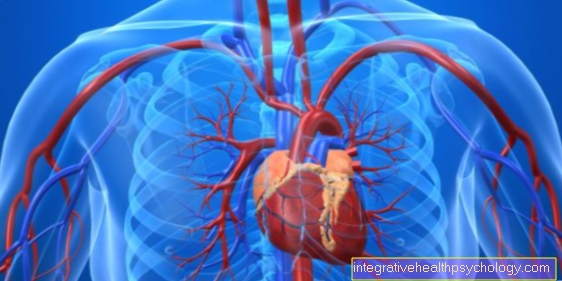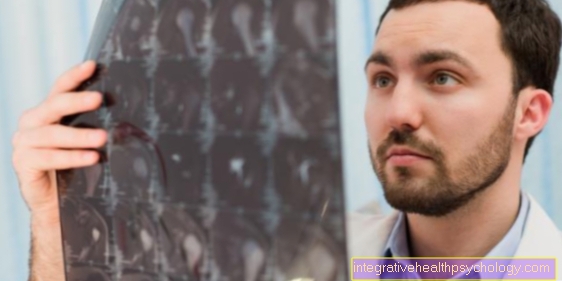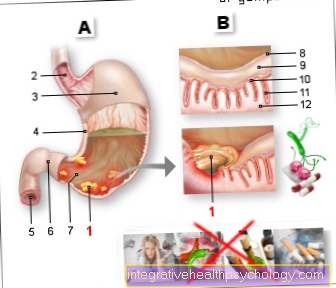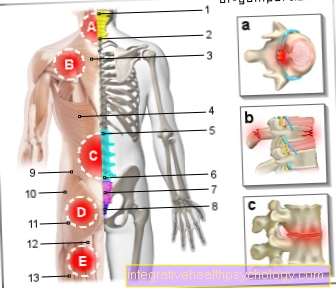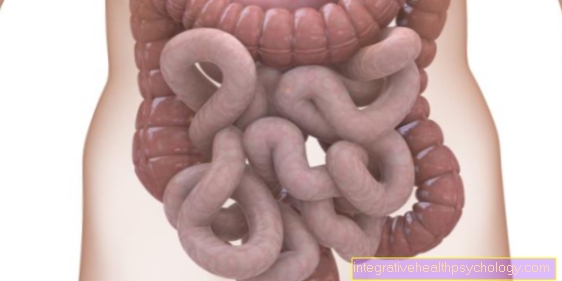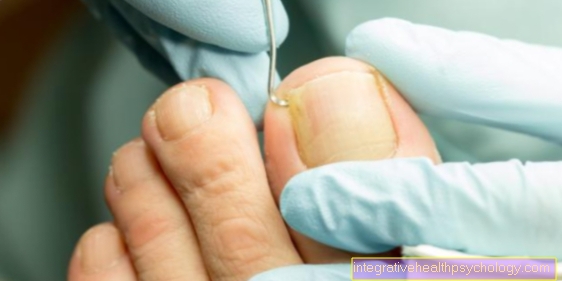Abdominal pain from the pill
introduction
The birth control pills, commonly referred to simply as the "pill", has been the most widely used since the early 1960s Contraceptives in the industrialized nations. Understandably, interfering with the body's sensitive hormonal system can also lead to side effects.
Serious complications such as thrombosis (see: Thrombosis while taking the pill) and high blood pressure are fortunately rarely encountered. Common side effects, however, include intermenstrual bleeding and spotting, irregular cycles after stopping the pill (see: Menstrual irregularities), Migraines and a feeling of tightness in the breasts. However, many women suffer from gastrointestinal complaints, especially when they first take pills. There are particularly frequent complaints stomach pain, nausea and Indigestion.

treatment
In the case of abdominal pain caused by the pill, it makes sense first of all to be seen. In the first days to weeks Many women experience abdominal pain after taking birth control pills. In most cases, however, these will go away within about two to three weeks. In the case of moderate abdominal pain that can still be endured, the pill can therefore continue to be taken and the first cycle or the start of the period can be waited for. However, if the pain still persists at the beginning of the second cycle, i.e. when the second blister has started, a gynecologist should always be consulted. On the other hand, the pain should start from the beginning very strong or increase in intensity over time, it is recommended that the Stop taking the pill straight away and one See a gynecologist.
Painkillers such as ibuprofen or paracetamol do not impair the effect of the pill, so that they can be used to treat abdominal pain caused by the birth control pill without any problems. Since it is also possible that the stomach ache on one Gastric ulcer (Gastric ulcer) can be traced back to so-called Proton pump inhibitors such as pantoprazole to inhibit gastric acid production. Indications of a stomach ulcer are sharp pain in the left upper abdomen, nausea and belching, which can both increase and decrease with food.
However, none of these drugs should be taken for a long period of time, as this can lead to other side effects, including stomach ulcers and headaches. If you are unsure about your abdominal pain or taking the pill, it is always advisable to consult a gynecologist.
Stopping the pill
As already mentioned, it is advisable to stop taking the pill if the abdominal pain is very severe. If this is the case, it is advisable to use so-called barrier methods such as the condom (see also: Safety of the condom) switch. You should also consult a gynecologist and describe the symptoms. He may possibly prescribe other hormone preparations or others Contraceptive methods recommend.
Abdominal pain from the morning-after pill
The "Morning-after pill"Should in no case be regarded as a regular contraceptive. On the one hand, its effect quickly decreases when taken frequently, on the other hand, it has clearly stronger side effects.
Put simply, the morning-after pill works via one Delay in ovulationso that the sperm do not have a mature egg available for fertilization. However, this effect is not without consequences: above all stomach pain and irregularities in the period and Menstrual cycle disorders in general, side effects are quite common. There can also be complaints such as Nausea, tiredness, spotting and intermenstrual bleeding, headache and dizziness. However, these symptoms usually subside after a short time. A doctor should nevertheless be consulted if the abdominal pain is very severe or persistent or if the withdrawal bleeding does not occur or is only very weak. If you are unsure about taking the morning-after pill, a visit to the gynecologist is always justified.
Take the pill
The Taking the birth control pill, also called long cycle, offers through the No menstrual period many advantages in everyday life. For this reason, many women choose to postpone their period for several months.
So-called Single phase pills consist of a fixed combination of estrogen and progestin, which remains the same with every single pill. Follow the Pill break, it occurs due to the drop in hormones Menstruation. However, it can Take through from single-phase pills to noticeable Side effects to lead. Especially at the beginning of a long cycle, many women experience spotting and intermenstrual bleeding as well as abdominal pain. Because of the possible side effects, it is always advisable to consult a gynecologist before taking the birth control pill.
It is different with one Two-phase pill, a so-called sequence preparation. In the first few days after the start of taking, this initially only releases estrogen. In the second week, progestin is also added. Because of this, this is Cannot take two-phase pills and can lead to a variety of side effects such as severe abdominal pain.
How the pill works
When taken correctly, the pill is a reliable and very practical means of preventing pregnancy, which most women tolerate quite well overall. Their effect is usually based on the synthetic estrogen "Ethinylestradiol", which is usually with artificial progestins is combined. In addition, there is also a variant that only contains estrogens, the so-called "minipill".
These two hormones are naturally produced in the woman's body in a finely tuned cycle. On the one hand, they ensure the maturation of the egg cell in the ovary, which occurs around the 14th day in the ovulation (Ovulation) culminates. On the other hand, they promote the growth of the uterine lining, in which the egg cell is implanted if fertilization is successful. If the egg cell does not fertilize and implant, the lining of the uterus is shed as a result, which becomes noticeable in the form of menstrual bleeding and the associated symptoms (see also Pain menstruation). This cycle is disrupted by taking birth control pills so that the egg cannot mature. Ultimately, this prevents ovulation so that there is no mature egg available for fertilization, which prevents pregnancy.


